|
|
|
Sort Order |
|
|
|
Items / Page
|
|
|
|
|
|
|
| Srl | Item |
| 1 |
ID:
091298
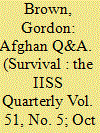

|
|
|
|
|
| Publication |
2009.
|
| Summary/Abstract |
You, sir, refer quite frequently and properly to the alliance and to what our allies are doing … But if one is to read the press in this country, one would believe that we were the only people out there, we were the only people making any effort, we were the only people taking any sacrifices. In fact we are, of course, a small if not a vital part of a very much larger alliance, of which the United States are making by far the greater contribution and suffering the greatest losses … We have got obligations as allies which we cannot weasel out of … Our success [in Afghanistan] is the success of the West as a whole, not simply of this country. And our contribution there goes very much more deeply than simply establishing stable governance in Afghanistan: it is establishing the success, the self-confidence of the West under a very, very heavy general threat. So, would you not agree, sir, that … so long as the Americans are there we've got to be there as well?
|
|
|
|
|
|
|
|
|
|
|
|
|
|
|
|
| 2 |
ID:
091297
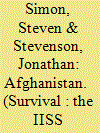

|
|
|
|
|
| Publication |
2009.
|
| Summary/Abstract |
US President Barack Obama's current policy favours escalation in Afghanistan. The idea is that as the United States' military presence in Iraq is drawn down, the use of force can be refocused on Afghanistan to forge a more viable state. The principal instruments of this policy are more American troops with better force protection (a customised version of the counter-insurgency 'surge' employed with ostensible success in Iraq) and firmer bilateral diplomacy with Pakistan. The administration's policy appears to be overdetermined. The premise of the policy is that the United States must 'own' Afghanistan in order to defend its strategic interests. But that premise begs the question of whether US strategic interests actually require the United States to assume the grand and onerous responsibility of rebuilding the Afghan state. They do not.
|
|
|
|
|
|
|
|
|
|
|
|
|
|
|
|
| 3 |
ID:
091304
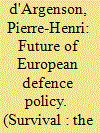

|
|
|
|
|
| Publication |
2009.
|
| Summary/Abstract |
Although ESDP has made considerable progress in the past ten years, it will soon have to make choices on its final aims: either to make the European Union a subcontractor of international security or to become the major instrument of the EU's strategic interests in the world. In any case, EU states should preserve ESDP's specific nature among other EU policies if they want to secure its future, as it would lose its value if diluted in institutional machinery incompatible with the moral and operational requirements of military engagement.
|
|
|
|
|
|
|
|
|
|
|
|
|
|
|
|
| 4 |
ID:
091299
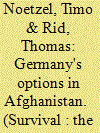

|
|
|
|
|
| Publication |
2009.
|
| Summary/Abstract |
Germany's military mission in Afghanistan has become increasingly politicised in the eight years since it was launched. Political and ideological differences between parties and even between ministries are becoming more pronounced, not less. This trend narrows the room for manoeuvre and limits the strategic debate. Greater instability in Kunduz province, at the heart of Germany's area of regional responsibility in Afghanistan, has two immediate effects: it both increases the need to act decisively and it heightens the risk of political paralysis in Berlin. This article argues that the latter is likely to prevail.
|
|
|
|
|
|
|
|
|
|
|
|
|
|
|
|
| 5 |
ID:
091303


|
|
|
|
|
| Publication |
2009.
|
| Summary/Abstract |
There is growing recognition of the new strategic significance of the Arctic. Tensions have been rising between Russia and the four other Arctic Ocean littoral states as climate change alters the region's geostrategic dynamics. There are unresolved disputes among the four NATO members, the fault lines between the NATO states on the one hand and Russia on the other appear to be deepening, and the sense of common space is under pressure. Military conflict, while not likely, cannot entirely be ruled out. There is a risk that the overall strategic objective of maintaining stability could be forgotten. Growing military activity, closer security coordination among the Western states, and inflammatory rhetoric could set off a vicious circle, jeopardising the wide-ranging collaboration put in place since the end of the Cold War.
|
|
|
|
|
|
|
|
|
|
|
|
|
|
|
|
| 6 |
ID:
091301
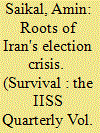

|
|
|
|
|
| Publication |
2009.
|
| Summary/Abstract |
The Iranian leadership's handling of the dispute over the June 2009 presidential election not only bitterly alienated a sizeable proportion of the population; it also deeply split the ruling clerics. The government has lost the support of many ranking Islamist figures, whose continued backing is necessary to maintain its coherence and effectiveness, and its legitimacy has been eroded. If it fails to modify its authoritarian Islamist mindset and power structure to claw back some, if not all, of its lost clerical and public support, the scene is set for a greater popular backlash in the long run. The current turmoil, ostensibly sparked by the election results, stems from a confluence of factors, including growing public discontent with the regime's theocratic behaviour, economic mismanagement and foreign-policy embarrassments, especially since Ahmadinejad became president in 2005. These are symptomatic, however, of deeper structural problems in the nature of the Islamic government that has evolved in Iran.
|
|
|
|
|
|
|
|
|
|
|
|
|
|
|
|
| 7 |
ID:
091302


|
|
|
|
|
| Publication |
2009.
|
| Summary/Abstract |
Turkey is now more polarized than at any other time since the left-right violence that engulfed the country during the 1970s. As Prime Minister Recep Tayyip Erdogan and the Justice and Development Party (AKP) have lurched from one crisis to another over the last two years, the domestic coalition that brought them to power has fractured. In an effort to satisfy different constituencies, AKP has jettisoned prudent reformism in favour of ad hoc policies. If its Western partners do not act, Turkey will drift away from the United States and Europe in the powerful undercurrents of populism, nationalism and authoritarianism.
|
|
|
|
|
|
|
|
|
|
|
|
|
|
|
|
|
|
|
|
|